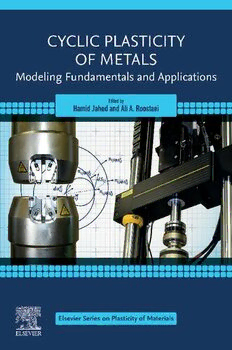Table Of ContentCyclic Plasticity of Metals
Modeling Fundamentals and Applications
Elsevier Series on Plasticity of Materials
ThePlasticityofMaterialsbookseriessummarizesfoundationalknowledgeandoutlinesrecentdevel-
opmentsinthefieldofmaterialsplasticity.Featuringinvestigationsatallscales,includingexperimental,
constitutivemodeling,andnumericalapproachesforgoverningequations,eachvolumeintheseriesaimsto
providevision,insight,andsolutionstofundamentalandappliedproblems,aswellasunifyingmulti-scale
approaches.Itcoversabroadrangeofcontentinmechanics,materialsciences,manufacturing,mechanical,
automotive,civil,environmental,mining,andpetroleumengineeringforanarrayofaudiencesincluding
students,researchers,andprofessionalengineers.
SeriesEditor-in-Chief:FrédéricBarlat
ProfessorFrédéricBarlatisoneoftheleadingresearchersinthefieldofmechanicsofmaterialsandhas
publishedover250articlesinpeer-reviewedscientificjournals.FollowinghisPhD,hejoinedAlcoaTech-
nicalCenteroutsidePittsburgh,PAwhereheworkedforover20yearsbeforemovingtoSouthKoreawhere
hebecameafullprofessoratPohangUniversityofScienceandTechnology.Heisanhonorarymemberof
theRomanianAcademyandreceivedthe2013KhanInternationalAwardforoutstandinglife-longcontri-
butionstothefieldofplasticity.Hisresearchfocusesonthedevelopmentofinnovativeplasticitytheories
formetalsaswellasmanufacturingtechnologiesforsheetproducts.
SeriesDeputyEditor:OanaCazacu
Dr.CazacuisaProfessorofMechanicsatUniversityofFlorida’sGraduateResearchEngineeringandEdu-
cationCenter(UF/REEF).ShehasHabilitationandDoctoraldegreesfromtheUniversityofLille(France)
andhasbeentherecipientofvisitingchairprofessorshipsinEuropeandAustralia.SheisanAssociateEdi-
torofMechanicsResearchCommunicationandtheInternationalJournalofMaterialFormingandalsothe
authorofamonograph,12bookchapters,over150peer-reviewedpapers,andhaseditedanother5books.
Sheiswidelyrecognizedforhercontributionstomodelingplasticanisotropyanddamageinmetallicand
geologicalmaterials.
SeriesDeputyEditor:RenéDeBorst
Dr.DeBorstistheCentenaryProfessorofCivilEngineeringattheUniversityofSheffield.Hewasprevi-
ouslyDistinguishedProfessoratDelftUniversityofTechnologyandEindhovenUniversityofTechnology,
andtheRegiusProfessorofCivilEngineeringandMechanicsattheUniversityofGlasgow.Hisworkcov-
ersseveraltopicsinengineeringmechanicsandmaterials,suchasplasticityandfractureofconcrete,soils,
composites,andrubbers,aswellasthedevelopmentofnumericalmodelsfordeformationandfailure.He
istheauthorof2books,haseditedanother14booksandconferenceproceedings,andhaswrittenover230
peer-reviewedpapersand30bookchapters.HeisamemberoftheRoyalNetherlandsAcademyofArtsand
Sciences,afellowoftheRoyalSocietyofEdinburgh,andtheRoyalAcademyofEngineeringinLondon.
HealsoholdsanhonorarydoctoratefromINSALyon.
SeriesDeputyEditor:A.ErmanTekkaya
Dr. A. Erman Tekkaya is currently a professor and the director of the Institute for Metal Forming and
LightweightComponents(IUL)attheTechnischeUniversitätDortmund.Hisresearchinterestscoverfun-
damentalsandtechnologyofnovelmetalformingprocesses,materialcharacterizationformodelingthe
materialbehaviorduringplasticdeformations,anddamage-controlledmetalformingprocessesimproving
theusabilityoftheformedcomponents.HewasawardedtheInternationalPrizeforResearch&Develop-
mentinPrecisionForgingbytheJapaneseSocietyforTechnologyofPlasticityin2014.Heisafellowof
theInternationalAcademyforProductionEngineering(CIRP)andmemberoftheBoardofTrusteesofthe
GermanResearchAssociationforSteelApplication(FOSTA).Hehaspublishedover210peer-reviewed
papersandhasover30patentsgrantedorfiled.
Availableandforthcomingvolumes
• Gradient-EnhancedContinuumPlasticitybyGeorgeVoyiadjis(2020)
• PlasticityofMetallicMaterialsbyOanaCazacuandBenoitRevil-Baudard(2020)
• Material Modeling with the Visco-Plastic Self-Consistent Approach by Carlos Tome and Ricardo
Lebensohn(2021)
• ThermomechanicsofSolidsandStructuresbyMarkoCanadija(2022)
Elsevier Series on Plasticity of Materials
Cyclic Plasticity of Metals
Modeling Fundamentals and
Applications
Series Editors
Frédéric Barlat
Oana Cazacu
René De Borst
A. Erman Tekkaya
Edited by
Hamid Jahed
Ali A. Roostaei
Elsevier
Radarweg29,POBox211,1000AEAmsterdam,Netherlands
TheBoulevard,LangfordLane,Kidlington,OxfordOX51GB,UnitedKingdom
50HampshireStreet,5thFloor,Cambridge,MA02139,UnitedStates
Copyright©2022ElsevierInc.Allrightsreserved.
MATLAB®isatrademarkofTheMathWorks,Inc.andisusedwithpermission.
TheMathWorksdoesnotwarranttheaccuracyofthetextorexercisesinthisbook.
Thisbook’suseordiscussionofMATLAB®softwareorrelatedproductsdoesnotconstituteendorsement
orsponsorshipbyTheMathWorksofaparticularpedagogicalapproachorparticularuseofthe
MATLAB®software.
Nopartofthispublicationmaybereproducedortransmittedinanyformorbyanymeans,electronicor
mechanical,includingphotocopying,recording,oranyinformationstorageandretrievalsystem,without
permissioninwritingfromthepublisher.Detailsonhowtoseekpermission,furtherinformationabout
thePublisher’spermissionspoliciesandourarrangementswithorganizationssuchastheCopyright
ClearanceCenterandtheCopyrightLicensingAgency,canbefoundatourwebsite:
www.elsevier.com/permissions.
ThisbookandtheindividualcontributionscontainedinitareprotectedundercopyrightbythePublisher
(otherthanasmaybenotedherein).
Notices
Knowledgeandbestpracticeinthisfieldareconstantlychanging.Asnewresearchandexperience
broadenourunderstanding,changesinresearchmethods,professionalpractices,ormedicaltreatment
maybecomenecessary.
Practitionersandresearchersmustalwaysrelyontheirownexperienceandknowledgeinevaluatingand
usinganyinformation,methods,compounds,orexperimentsdescribedherein.Inusingsuch
informationormethodstheyshouldbemindfuloftheirownsafetyandthesafetyofothers,including
partiesforwhomtheyhaveaprofessionalresponsibility.
Tothefullestextentofthelaw,neitherthePublishernortheauthors,contributors,oreditors,assume
anyliabilityforanyinjuryand/ordamagetopersonsorpropertyasamatterofproductsliability,
negligenceorotherwise,orfromanyuseoroperationofanymethods,products,instructions,orideas
containedinthematerialherein.
LibraryofCongressCataloging-in-PublicationData
AcatalogrecordforthisbookisavailablefromtheLibraryofCongress
BritishLibraryCataloguing-in-PublicationData
AcataloguerecordforthisbookisavailablefromtheBritishLibrary
ISBN:978-0-12-819293-1
ForinformationonallElsevierpublications
visitourwebsiteathttps://www.elsevier.com/books-and-journals
Publisher:MatthewDeans
AcquisitionsEditor:DennisMcGonagle
EditorialProjectManager:RafaelG.Trombaco
ProductionProjectManager:SuryaNarayananJayachandran
Designer:MatthewLimbert
TypesetbyVTeX
Contents
Listofcontributors xi
Foreword xv
Preface xix
PartOne Introduction 1
1 Experimentalobservationsincyclicloadingofmetals 3
AliA.RoostaeiandHamidJahed
1.1 Introduction 3
1.2 Bauschingerphenomenon 3
1.2.1 Earlyreverseyielding 3
1.2.2 Transienthardeningandpermanentsoftening 4
1.2.3 Hardeningstagnation 4
1.2.4 Microstructurelink 5
1.3 Cyclichardening/softening 6
1.3.1 Fully-reversedloading 6
1.3.2 Additionalnonproportionalhardening 8
1.3.3 Microstructurelink 8
1.4 Meanstress/strainresponseevolution 9
1.4.1 Meanstressrelaxation 9
1.4.2 Ratcheting 9
1.4.3 Microstructurelink 11
1.5 Direction-dependentbehavior 11
1.5.1 Tension–compressionasymmetry 13
1.5.2 Directionalanisotropy 14
1.5.3 Microstructurelink 15
1.6 Masingbehavior 17
1.7 Closingremarks 19
References 19
2 Fundamentalsofcyclicplasticitymodels 23
AliA.RoostaeiandHamidJahed
2.1 Statesofstressandstrain 23
2.1.1 Stresstensors 23
2.1.2 Straintensors 32
2.2 Stress–strainrelations 35
2.2.1 Elasticity 35
2.2.2 Yieldcriteria 37
vi Contents
2.2.3 Plasticity 41
2.3 Hardeningrules 45
2.3.1 Isotropichardening 45
2.3.2 Kinematichardening 46
2.3.3 Combinedhardening 50
2.4 Closingremarks 50
References 50
PartTwo Cyclicplasticitymodels 53
3 Multisurfacecyclicplasticity 55
MeijuanZhang,MiguelÁngelSánz,KhanhNguyen,and
FranciscoJ.Montáns
3.1 Introduction 55
3.2 Generalframeworkforsmallstrainsbasedonstoredenergiesand
elasticcorrectorrates 57
3.3 Overlayandnestedsurfacemodels.TheMrózmodel 60
3.4 AtranslationruleforanimplicitimplementationoftheMróz
model 65
3.5 MultisurfacemodelusingPragertranslationrule 68
3.6 Connectionwithsubloadingandboundingsurfacemodels 78
3.7 Rheology-basedmodelswithoutexplicitbackstress 81
3.8 Comparisonofmultisurfacemodelsformultiaxialcyclicbehavior 83
3.9 LargestrainsformulationofBesselingmodels 86
3.10 Concludingremarks 96
References 97
4 Two-surfacecyclicplasticity 101
SeyedBehzadBehraveshandYannisF.Dafalias
4.1 Introduction 101
4.2 Fundamentalsoftwo-surfaceplasticity 102
4.2.1 Modelingofuniaxialloading 102
4.2.2 Generalizationtomultiaxialloading 111
4.2.3 Overshootingphenomenon 114
4.2.4 Solvedproblems 116
4.3 Furtherdevelopmentofthetwo-surfaceplasticity 127
4.3.1 McDowellmodel 127
4.3.2 Yoshida–Uemorimodel 129
4.3.3 Hassan–Kyriakidesmodel 131
4.4 Generalassessmentandcurrenttrends 133
4.4.1 Generalassessment 133
4.4.2 Currenttrends 135
4.5 Conclusion 136
Acknowledgments 137
References 137
Contents vii
5 Nonlinearkinematichardeningcyclicplasticity 139
A.Varvani-Farahani
5.1 Introduction 139
5.2 Kinematichardeningmodels 140
5.2.1 Uncoupledmultisurfacehardeningmodels 140
5.2.2 Coupledkinematichardeningmodels 142
5.2.3 Evaluationofvariousmodelsbasedonstrain-controlled
cyclicresults 151
5.3 Kinematichardeningrulescoupledwithinfluentialdescriptions 152
5.3.1 Kinematichardeningrulescoupledwithviscoplasticflow
description 152
5.3.2 KinematichardeningrulescoupledwiththeNeuber
hypothesisinthepresenceofstressraisers 160
5.3.3 Kinematichardeningrulescoupledwithyieldsurface
distortion 164
5.3.4 Kinematichardeningrulescoupledwithcontinuumdamage
mechanics 165
5.3.5 Kinematichardeningrulescoupledwithcrystalplasticity 165
5.4 Closingremarks 166
Acknowledgments 168
References 168
6 Distortionalhardeningcyclicplasticity 175
RenéMarek,SlavomírParma,andHeidiP.Feigenbaum
6.1 Introduction 175
6.1.1 Observingphenomenainstressspace 177
6.2 Experimentalmeasurementofyieldsurfacedistortion 178
6.2.1 Developmentofexperimentalresearch 179
6.2.2 Experimentalmethodstodetectyieldsurfacesdistortion 182
6.2.3 Yielddefinition 186
6.2.4 Elasticmoduliinfluence 189
6.2.5 Observedyieldsurfacedistortion 192
6.2.6 Synthesisofexperimentalresults 194
6.3 Modelingofyieldsurfacedistortion 197
6.3.1 Notablemodelsfeaturinguniaxialdistortion 197
6.3.2 Modelingmultiaxialdistortion 202
6.3.3 Yieldsurfaceconvexity 202
6.3.4 Showcasemodelofuniaxialdistortion 203
6.3.5 Evolutionrulesfordistortion 206
6.3.6 Modelingtheeffectofdistortionbyothermethods 208
6.4 Numericalsimulationsanddemonstrations 210
6.4.1 Calibrationfromexperimentaldata 210
6.4.2 Fewremarksonnumericalimplementation 212
6.4.3 Preservationoftheeffectofdistortion 213
6.4.4 Effectofdistortiononbiaxialratchetingpredictions 214
viii Contents
6.5 Conclusions 217
Acknowledgments 218
References 219
7 Computationalmethodsforcyclicplasticity 227
KaterinaD.PapouliaandM.RezaHirmand
7.1 Introduction 227
7.2 Thermomechanicalframework 228
7.2.1 Example:NonassociativeinviscidvonMisesplasticitywith
isotropicandnonlinearkinematichardening 235
7.2.2 Example:MultisurfaceinviscidvonMisesplasticitywith
Mrózkinematichardening 239
7.2.3 Example:Initiallyanisotropicviscoplasticitywithnonlinear
isotropichardening,linearkinematichardening,and
dynamicrecovery 242
7.3 Variationalprinciples 244
7.3.1 Displacementmethod 245
7.3.2 Assumedpressureanddilatationmethod 248
7.4 Constitutiveupdatealgorithms 250
7.4.1 Elastic–plasticoperatorsplit 252
7.4.2 Closestpointprojectionalgorithm 253
7.4.3 Algorithmictangentmoduli 255
7.4.4 Example:J plasticitywithnonlinearkinematichardening 256
2
7.4.5 Geometricalinterpretation 260
7.4.6 Returnmappingalgorithmforviscoplasticity 262
7.4.7 Cuttingplanealgorithm 263
7.4.8 Yieldsurfaceswithnondifferentiablepoints 265
7.5 Minimumprincipleforthedissipationpotential 269
7.6 Generalizedandendochronicplasticity 273
7.7 Closure 276
References 277
PartThree Applicationsofcyclicplasticity 281
8 Cyclicplasticityappliedtothenotchanalysisofmetals 283
GrzegorzGlinka,AliA.Roostaei,andHamidJahed
8.1 Introduction 283
8.2 Stressstatesatanotchtip 283
8.3 TheNeuberrule 285
8.3.1 TheoriginalNeuberrule(MethodA) 287
8.3.2 TheNeuberrulebasedontheequivalenceofthestrain
energydensity(MethodB) 288
8.3.3 TheNeuberrulebasedonthelinearpseudoelasticnotchtip
stress(MethodC) 290
Contents ix
8.3.4 TheNeuberrulebasedonthepseudoelasticstressfield
aheadofanotchtip(MethodD) 292
8.4 EquivalentStrainEnergyDensity(ESED)rule 293
8.4.1 TheoriginalESEDrule(MethodE) 293
8.4.2 ThecorrectedESEDrule(MethodF) 295
8.4.3 TheESEDrulebasedonthelinearpseudoelasticstressat
thenotchtip(MethodG) 298
8.4.4 TheESEDrulebasedonthedistributionofthe
pseudoelasticstressaheadofthenotchtip(MethodH) 298
8.5 Notchesunderuniaxialcyclicloadings 300
8.5.1 Constantamplitudecyclicloading 301
8.5.2 Variableamplitudecyclicloading 303
8.5.3 Biaxialtransformationofconstitutiverelationship 304
8.6 Notchesundermultiaxialcyclicloading 304
8.6.1 Proportionalmultiaxialloading 305
8.6.2 Nonproportionalmultiaxialloading 312
8.7 Extensionofthenotchanalysistoasymmetric/anisotropicmetals 317
8.7.1 Analysisprocedure 318
8.7.2 Experimentalvalidation 318
8.8 Summary 320
References 322
9 Applicationofcyclicplasticityformodelingratchetinginmetals 325
GuozhengKangandQianhuaKan
9.1 Introduction 325
9.2 Evolutionfeaturesofratcheting 326
9.2.1 Effectofcyclicsoftening/hardeningbehavior 326
9.2.2 Effectofstresslevel 328
9.2.3 Effectofstressrate 329
9.2.4 Effectofambienttemperature 329
9.2.5 Effectofloadingpath 331
9.3 Cyclicplasticitymodelsofratcheting 332
9.3.1 Outlineofcyclicplasticitymodels 333
9.3.2 Simulationofratchetinginmetals 337
9.4 Ratchetingofstructurecomponentsanditseffectonfatiguefailure 343
9.4.1 Finiteelementmodel 345
9.4.2 Validatingratchetingstrainpredictions 346
9.4.3 Simulatedequivalentplasticstrainfieldanditsevolution 346
9.4.4 Predictionofrollingcontactfatiguecrackinitiationlife 347
9.5 Closingremarks 351
References 351
10 Applicationofcyclicplasticitytofatiguemodeling 357
JafarAlbinmousaandTimothyTopper
10.1 Introduction 357

